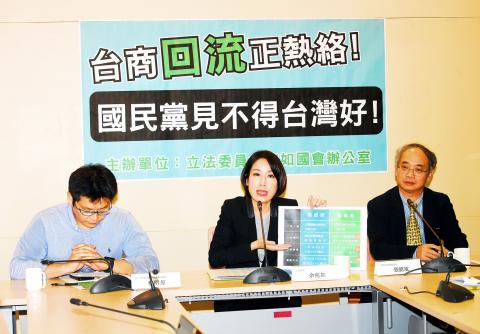Manufacturing output last quarter declined for a third straight quarter, shrinking 7.01 percent year-on-year to NT$3.37 trillion (US$110.46 billion), the Ministry of Economic Affairs (MOEA) said yesterday, attributing it to sluggish global economic growth due to the US-China trade conflict.
While the manufacturing sector would continue to bear the weight of the trade tensions, companies’ relocating their production back to Taiwan, new technologies and various applications, including 5G, artificial intelligence and high-performance computing, could help drive up output going forward, the ministry said.
The decline in output last quarter was led by the electronics components industry — the manufacturing sector’s most important industry — which slid 3.81 percent to NT$940.6 billion, it said.

Photo: CNA
LCD production, for one, declined as the market remained oversaturated due to increasing Chinese supplies, it said.
However, an increase in chip production as companies build inventory ahead of new product launches helped cushion the fall, it added.
Output from the computer, electronics goods and optical components industry expanded 25.85 percent on an annual basis to hit a six-year high of NT$207.2 billion, thanks to increasing production of servers, networking and communications equipment, automotive electronic control units and thermostat controllers.
New smartphone models driving up production of camera lenses further contributed to the industry’s output last quarter, the ministry said.
Affected by falling international crude oil prices and routine plant maintenance, chemical materials output fell 23.95 percent to NT$400.7 billion, the ministry said.
Base metal output sank 13.41 percent to NT$338.1 billion, as the steel market was hit by US and European tariffs, cheap imported steel products and waning demand for new vehicles, it said.
As companies put their brakes on investing in equipment due to rising market uncertainties stemming from the US-China trade dispute, the machinery equipment industry’s output contracted 13.22 percent to NT$159.2 billion.
For the eighth quarter in a row, the vehicle and auto parts industry’s output declined 4.04 percent to NT$84.4 billion, as domestic automakers faced tough import competition and customers digested inventory, it said.

Taiwan Semiconductor Manufacturing Co (TSMC, 台積電) last week recorded an increase in the number of shareholders to the highest in almost eight months, despite its share price falling 3.38 percent from the previous week, Taiwan Stock Exchange data released on Saturday showed. As of Friday, TSMC had 1.88 million shareholders, the most since the week of April 25 and an increase of 31,870 from the previous week, the data showed. The number of shareholders jumped despite a drop of NT$50 (US$1.59), or 3.38 percent, in TSMC’s share price from a week earlier to NT$1,430, as investors took profits from their earlier gains

In a high-security Shenzhen laboratory, Chinese scientists have built what Washington has spent years trying to prevent: a prototype of a machine capable of producing the cutting-edge semiconductor chips that power artificial intelligence (AI), smartphones and weapons central to Western military dominance, Reuters has learned. Completed early this year and undergoing testing, the prototype fills nearly an entire factory floor. It was built by a team of former engineers from Dutch semiconductor giant ASML who reverse-engineered the company’s extreme ultraviolet lithography (EUV) machines, according to two people with knowledge of the project. EUV machines sit at the heart of a technological Cold

Taiwan’s long-term economic competitiveness will hinge not only on national champions like Taiwan Semiconductor Manufacturing Co. (TSMC, 台積電) but also on the widespread adoption of artificial intelligence (AI) and other emerging technologies, a US-based scholar has said. At a lecture in Taipei on Tuesday, Jeffrey Ding, assistant professor of political science at the George Washington University and author of "Technology and the Rise of Great Powers," argued that historical experience shows that general-purpose technologies (GPTs) — such as electricity, computers and now AI — shape long-term economic advantages through their diffusion across the broader economy. "What really matters is not who pioneers

TAIWAN VALUE CHAIN: Foxtron is to fully own Luxgen following the transaction and it plans to launch a new electric model, the Foxtron Bria, in Taiwan next year Yulon Motor Co (裕隆汽車) yesterday said that its board of directors approved the disposal of its electric vehicle (EV) unit, Luxgen Motor Co (納智捷汽車), to Foxtron Vehicle Technologies Co (鴻華先進) for NT$787.6 million (US$24.98 million). Foxtron, a half-half joint venture between Yulon affiliate Hua-Chuang Automobile Information Technical Center Co (華創車電) and Hon Hai Precision Industry Co (鴻海精密), expects to wrap up the deal in the first quarter of next year. Foxtron would fully own Luxgen following the transaction, including five car distributing companies, outlets and all employees. The deal is subject to the approval of the Fair Trade Commission, Foxtron said. “Foxtron will be